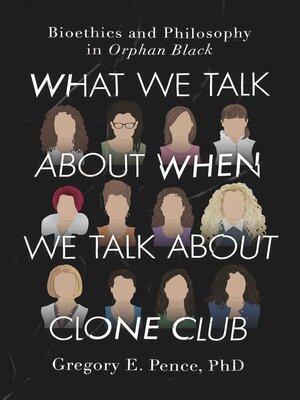What We Talk About When We Talk About Clone Club
ebook ∣ Bioethics and Philosophy in Orphan Black
By Gregory E. Pence

Sign up to save your library
With an OverDrive account, you can save your favorite libraries for at-a-glance information about availability. Find out more about OverDrive accounts.
Find this title in Libby, the library reading app by OverDrive.



Search for a digital library with this title
Title found at these libraries:
| Loading... |
What is the real-world history and science of human cloning, and does Orphan Black get it right? Can you "own" a person—even a cloned one? How can Sarah Manning be straight, Cosima gay, and Tony trans? Cult hit sci-fi show Orphan Black doesn't just entertain—it also raises fascinating questions about human cloning, its ethics, and its impact on personal identity.
In What We Talk About When We Talk About Clone Club: Bioethics and Philosophy in Orphan Black, prominent bioethicist Gregory E. Pence violates Clone Club's first rule to take us deeper into the show and its connections to the real world, including:
Widespread myths about human clones (and Orphan Black's rejection of them)
Our ugly history of eugenics
The ethics of human experimentation, by way of Projects Castor and Leda
What we can learn about clones and identity from twin studies and tensions among Orphan Black's clone "sisters"
Kendall Malone and other genetic anomalies
The brave new world of genetic enhancement and clonal dynasties, and how Helena and Kira Manning fit in
In the process, What We Talk About When We Talk About Clone Club reveals why Orphan Black is some of today's most engaging and thought-provoking television.
In What We Talk About When We Talk About Clone Club: Bioethics and Philosophy in Orphan Black, prominent bioethicist Gregory E. Pence violates Clone Club's first rule to take us deeper into the show and its connections to the real world, including:
Widespread myths about human clones (and Orphan Black's rejection of them)
Our ugly history of eugenics
The ethics of human experimentation, by way of Projects Castor and Leda
What we can learn about clones and identity from twin studies and tensions among Orphan Black's clone "sisters"
Kendall Malone and other genetic anomalies
The brave new world of genetic enhancement and clonal dynasties, and how Helena and Kira Manning fit in
In the process, What We Talk About When We Talk About Clone Club reveals why Orphan Black is some of today's most engaging and thought-provoking television.






